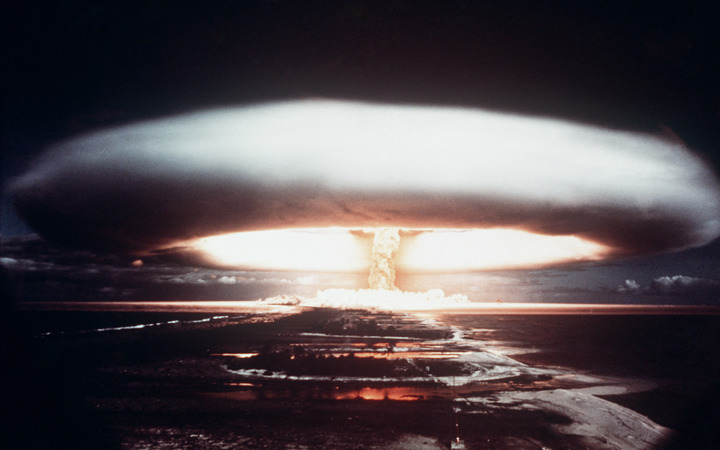Survivors of a New Zealand Navy peace mission to observe nuclear weapons testing in French Polynesia 50 years ago are calling for more official recognition.
France conducted around 190 nuclear tests from 1966 to 1996 at Mururoa and Fangataufa atolls.
More than 40 atmospheric tests were also carried out in the region.
In 1973, after France ignored an international court ruling to end testing, the frigates Otago and Canterbury – with 500 sailors onboard – were dispatched to Mururoa atoll by then-Prime Minister Norman Kirk.
Their task was to be what he called “a silent accusing witness with the power to bring alive the conscience of the world”.
While the protest achieved some success, testing continued but underground.
It also saw the anti-nuclear movement grow, leading eventually in 1987 to a nuclear-free New Zealand.
1News reporter Simon Mercep was in Mururoa for two days in 1995 to investigate the fallout.
At the time, he spoke of how a thousand French military personnel, and hundreds of scientists and civilian workers, prepared to detonate a nuclear bomb.
In a hangar, bombs were being assembled in 70 tonne tubes, as a floating platform transported the devices to the test site.
Mercep joined the veterans as they were reunited after five decades.
Veteran John Carter said there were no nerves on board the HMNZS Otago, only “a bit of frivolity, of bare backsiding the French planes that flew past”.
“We ducked down when the 2310 came on, and then looked up and basically saw a very small cloud going up.”
While the sailors took part in one of the most significant chapters in modern New Zealand history, the survivors say they also feel completely let down by a government that failed to properly look after them and their families.
The Mururoa Nuclear Veterans Group believes more than 130 of their children and grandchildren may have suffered genetic damage.
“Well it’s bloody shameful, is all I can say,” the group’s president, Gavin Smith, said.
Smith said one of his fellow sailor’s granddaughters has only peripheral eyesight, while another has a significant learning disability.
They believe the problem was contaminated seawater.
“We brought the seawater on board those ships, desalinated it and then we drank it, washed it, prepared our food in it,” he said.
Charlie Lamb, who was on board the HMNZS Otago, remembered then-Prime Minister Kirk promising to look after the sailors and their families as he bid them farewell.
“He said, ‘We will look after you, we will look after you,” Lamb said.
“But we haven’t been looked after.”
An official Mururoa medal was unveiled Friday night. Last week, a report was also released recommending the Government provide veterans’ families with genetic testing.
“I’ve heard you, and that is now my job to carry your fight into the spaces where it needs to happen,” Veterans’ Affairs Minister Peeni Henare said.
Michael Bain, the son of one Mururoa sailor, said Cabinet must act.
“I encourage Cabinet Ministers to listen and do the right thing,” he said.
SOURCE: TVNZ/PACNEWS














